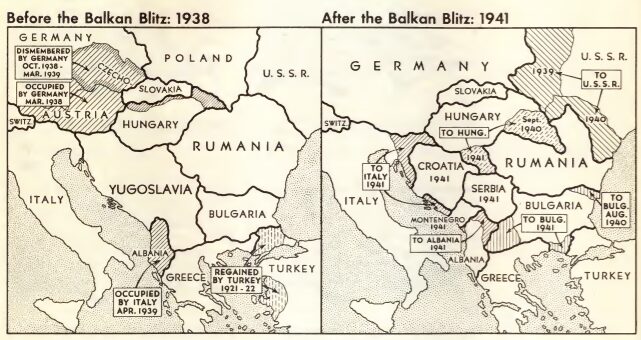raharris1973
Gone Fishin'
What if Mussolini invaded Yugoslavia at the end of October1940 instead of Greece? Let's assume that any of the build-up of forces, and build up of tensions or demands that occurred vis-a-vis Greece in earlier October and possibly September is directed toward Yugoslavia rather than Greece, for the most part.
Mussolini's motive, like in the OTL Greek case, is to make a strong move to assert Italian influence in the Balkans, especially after the German move to change Romania's borders and send troops there without consulting the Italians or their interests. He simply uses Yugoslavia as the stage to make a show, rather than Greece.
Instead of just attacking the target from Albania, as in the Greek case, the Italians also attack the Yugoslavs out of Venetia and Istria. They also employ their navy and air force in supporting landings and bombardments in Dalmatia in support of the ground prongs.
The Italians might have had plans of longer-standing and greater detail for Yugoslavia than for Greece. Whether that helps Italy is hard to say.
The broad front of attack should be helpful to the Italians, but Yugoslavia is a larger opponent, capable of fielding a larger army than Greece. Its borders and coastlines are also quite mountainous.
Yugoslavia is also less cohesive internally, with ethnic minority discontent by Slovenes, Croatians, Albanians, and Macedonians, and Mussolini's Ustashe ties. But it is hard to say whether Croatians make a clean break to work with the Italians or if fears for Italian territorial ambition in Dalmatia unites different Yugoslav groups in resistance.
Yugoslavia's main trading partner, Germany, will be pissed at Mussolini's off-script move, but they are stuck with Italy as an ally and cannot accept Yugoslavia having a successful resistance. How does Greece react to the aggression against its northern neighbor?
I imagine, unless the Italians face a truly improbable swift and definitive repulse, that Italy will be able to persuade Hungary and especially Bulgaria to enter the war against Yugoslavia to advance their own historical claims. And, if Italy or any of these allies bog down, or there appears to be Greek or British interference brewing, the Germans would probably get involved on the Italian and minor Axis side to end the conflict quickly.
I assume with this many opponents, it would be a matter of time before Yugoslavia falls and is ooccupied. Once the occupation of Yugoslavia is complete, what is the geopolitical situation of Greece? Can it remain largely undisturbed as a neutral country, trading with the Axis, like Turkey was? Or would security motives and the momentum of the Yugoslavia campaign lead on to Italian and Bulgarian operations aimed at occupying Greece, with German support probable? Or might Metaxas surprise us, 'go with the flow' and sign the Axis Pact as a method of holding on to territory and regime political power?
Mussolini's motive, like in the OTL Greek case, is to make a strong move to assert Italian influence in the Balkans, especially after the German move to change Romania's borders and send troops there without consulting the Italians or their interests. He simply uses Yugoslavia as the stage to make a show, rather than Greece.
Instead of just attacking the target from Albania, as in the Greek case, the Italians also attack the Yugoslavs out of Venetia and Istria. They also employ their navy and air force in supporting landings and bombardments in Dalmatia in support of the ground prongs.
The Italians might have had plans of longer-standing and greater detail for Yugoslavia than for Greece. Whether that helps Italy is hard to say.
The broad front of attack should be helpful to the Italians, but Yugoslavia is a larger opponent, capable of fielding a larger army than Greece. Its borders and coastlines are also quite mountainous.
Yugoslavia is also less cohesive internally, with ethnic minority discontent by Slovenes, Croatians, Albanians, and Macedonians, and Mussolini's Ustashe ties. But it is hard to say whether Croatians make a clean break to work with the Italians or if fears for Italian territorial ambition in Dalmatia unites different Yugoslav groups in resistance.
Yugoslavia's main trading partner, Germany, will be pissed at Mussolini's off-script move, but they are stuck with Italy as an ally and cannot accept Yugoslavia having a successful resistance. How does Greece react to the aggression against its northern neighbor?
I imagine, unless the Italians face a truly improbable swift and definitive repulse, that Italy will be able to persuade Hungary and especially Bulgaria to enter the war against Yugoslavia to advance their own historical claims. And, if Italy or any of these allies bog down, or there appears to be Greek or British interference brewing, the Germans would probably get involved on the Italian and minor Axis side to end the conflict quickly.
I assume with this many opponents, it would be a matter of time before Yugoslavia falls and is ooccupied. Once the occupation of Yugoslavia is complete, what is the geopolitical situation of Greece? Can it remain largely undisturbed as a neutral country, trading with the Axis, like Turkey was? Or would security motives and the momentum of the Yugoslavia campaign lead on to Italian and Bulgarian operations aimed at occupying Greece, with German support probable? Or might Metaxas surprise us, 'go with the flow' and sign the Axis Pact as a method of holding on to territory and regime political power?

